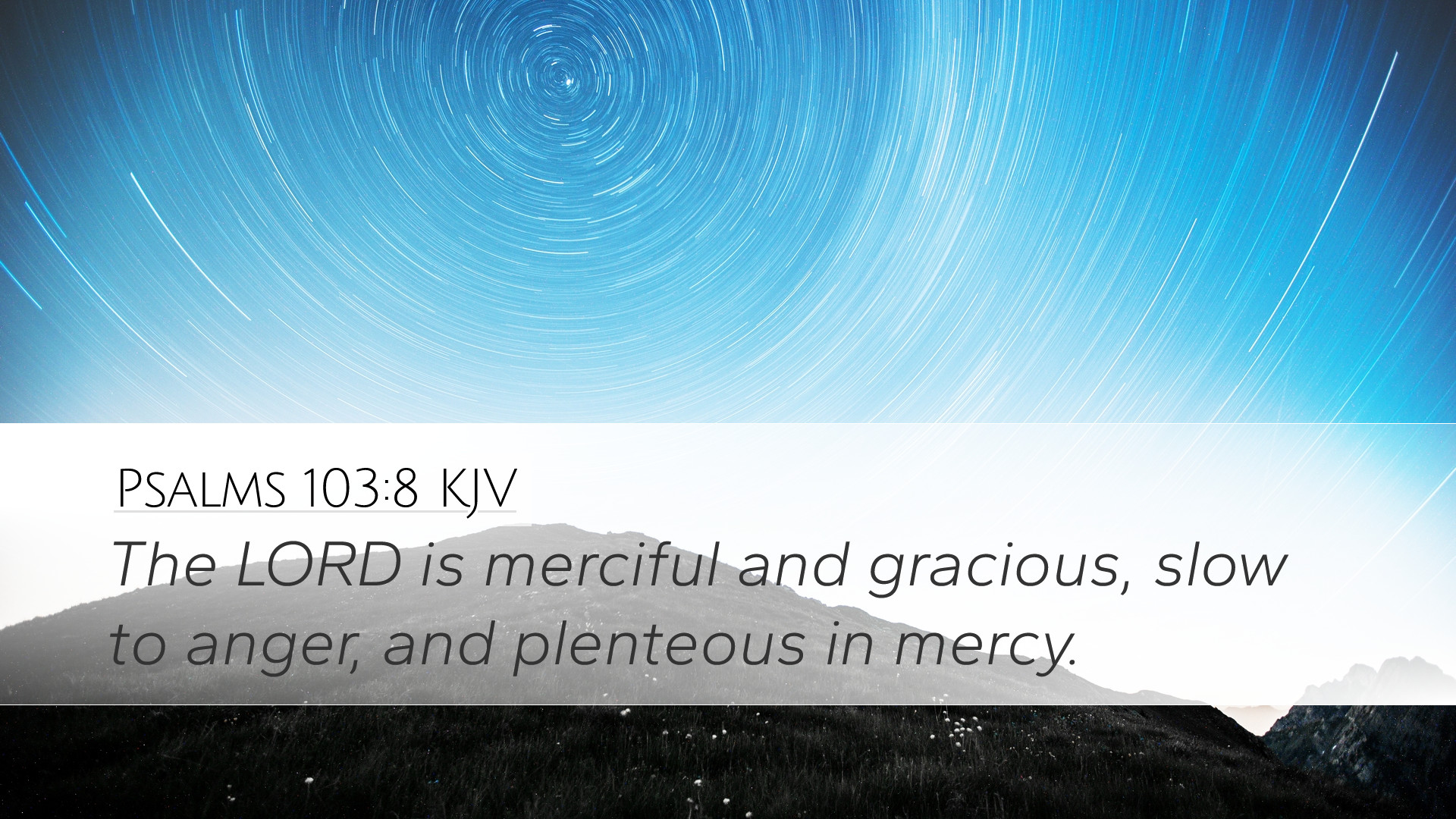Psalms 103:8 - Commentary Overview
Psalms 103:8 reads: "The LORD is merciful and gracious, slow to anger, and plenteous in mercy." This verse beautifully encapsulates essential attributes of God that resonate deeply with believers. Below is a thorough exploration of the implications and interpretations of this verse, drawing from the insights of Matthew Henry, Albert Barnes, and Adam Clarke.
Divine Attributes in Psalms 103:8
This verse emphasizes the righteousness and profound compassion of God. Each element described can be delved into to grasp the full meaning intended in the Hebrew Scriptures.
1. The LORD is Merciful
Mercy, in biblical terms, often reflects God's readiness to forgive and extend compassion. According to Matthew Henry, God's mercy is a central aspect of His character. He notes:
- Definition of Mercy: Mercy is an act of withholding punishment deserved. God does not deal with us according to our sins but provides grace instead.
- Examples in Scripture: Biblical narratives frequently highlight God's mercy, such as His dealings with Israel during their rebellion and failure.
2. Graciousness of God
Graciousness underscores God’s generosity and unmerited favor toward humanity. Albert Barnes states that God's grace is not merely the absence of punishment but includes His active bestowal of blessings upon those who do not deserve them:
- Grace Defined: Grace can be seen as the divine influence in believers' lives, leading them to a transformation that aligns with God's will.
- Life Application: This aspect calls Christians to mirror this grace in their relationships with others by being forgiving and generous.
3. Slow to Anger
The phrase "slow to anger" emphasizes God's patience. Adam Clarke elucidates that this concept reflects not only God's withholding of immediate judgment but also showcases His profound love and willingness to wait for repentance:
- Implications of Patience: God's patience serves as an invitation to repentance, illustrating His desire for humanity to return to Him without judgement.
- Contrast with Human Nature: Unlike humans, who are often quick to anger, God's patience encourages believers to cultivate a spirit of forgiveness toward others.
4. Plenteous in Mercy
When the psalmist declares that God is "plenteous in mercy," he acknowledges the infinite nature of God's compassion. Matthew Henry asserts that:
- Abundance of Mercy: God's mercy is abundant and overflowing, transcending human limitations. The mercy of God is not rationed but generously given.
- Impact on Believers: This abundance allows believers to approach God with confidence, knowing that His mercy is greater than their sin.
Theological Significance
The attributes highlighted in Psalms 103:8 are foundational to understanding the character of God and establishing our relationship with Him. They bear theological significance for several reasons:
- Covenantal Nature: The merciful and gracious disposition of God aligns with His covenantal promises to His people, affirming His commitment.
- Encouragement for Believers: Knowing that God embodies these attributes provides comfort for believers in times of distress, affirming the reliability of His nature.
- Missional Impetus: Understanding God’s mercy compels believers to engage in acts of service and compassion towards others, reflecting God's character in the world.
Practical Applications
As one reflects on Psalms 103:8, several practical applications arise for personal faith and communal living:
- Personal Reflection: Regularly meditate on God’s attributes to foster a deeper appreciation of His mercy and grace.
- Extending Forgiveness: As people who have received mercy, believers are called to practice forgiveness and grace towards others.
- Building Community: Cultivate an atmosphere within the church that mirrors God’s mercy, creating a supportive and loving community.
Conclusion
Psalms 103:8 offers profound insights into the nature of God, showcasing a deity who is merciful, gracious, patient, and rich in mercy. These insights encourage both personal transformation and communal engagement, urging believers to reflect these divine qualities in their lives. Through the teachings of public domain commentators, the timeless message of this verse resonates far beyond its words, impacting the hearts of pastors, students, theologians, and scholars in the pursuit of a deeper relationship with God.


